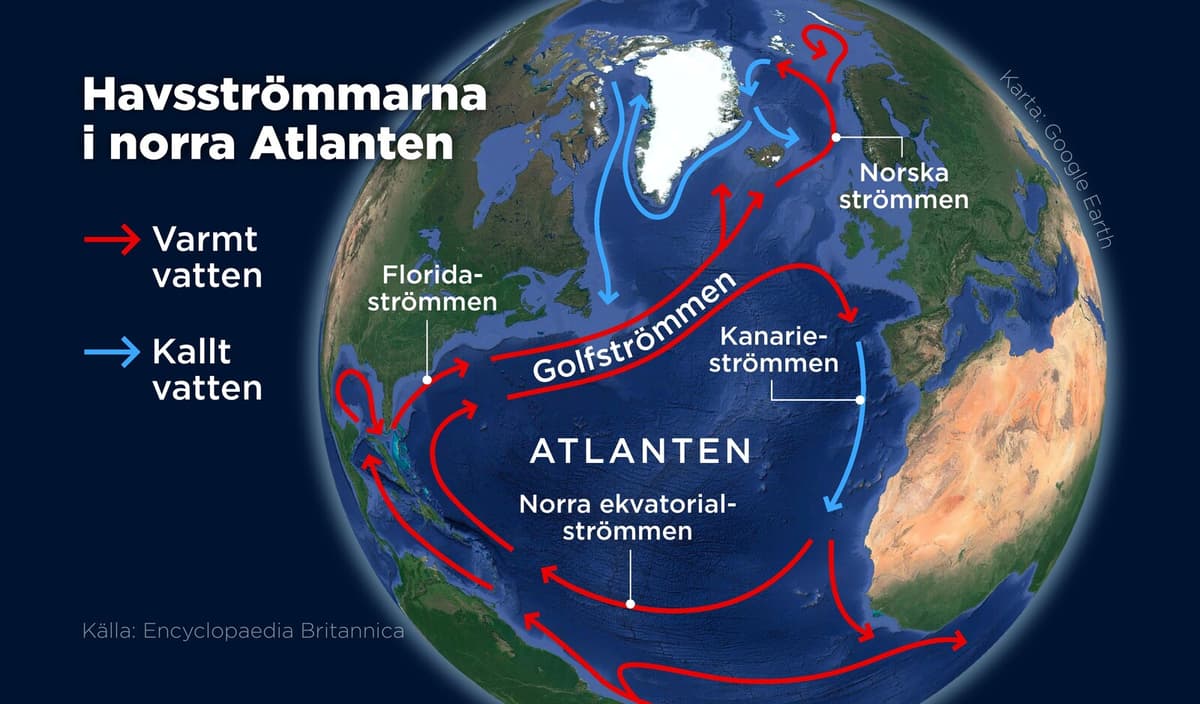In the ocean outside Greenland's southern tip, there is a place called "the cold blob" – one of the few places on Earth that has not warmed up over the past decades. Instead, it has become much cooler, which can be explained by the fact that large amounts of meltwater from the ice in the area have flowed into the sea. This risks disrupting one of the three major circulation systems in the world's oceans, the so-called Amoc, which includes the Gulf Stream.
If the system is disrupted, it could mean that the Gulf Stream collapses, with possible catastrophic climate consequences for Sweden and the other Nordic countries. This emerges from a new report that summarizes the conclusions of recent climate research, which Dagens Nyheter was the first to report on.
Open letter
I am worried, there are clear signs that Amoc is slowing down right now. If it continues and comes to a complete stop, it will become significantly colder in Scandinavia and even more extreme weather events, says Wendy Broadgate, co-author and global director for Future Earth in Sweden, to TT.
In an open letter to the Nordic governments ahead of the Nordic Council of Ministers in Reykjavik, 48 researchers warn of the consequences of changes to Amoc. They urge world leaders to reduce emissions and prepare societies for extreme weather events.
It's about, for example, securing infrastructure such as power and water networks for floods.
If Scandinavia becomes colder at the same time as global warming makes southern Europe warmer, the contrasts can lead to more extreme weather such as heavy rainfall and storms. To reduce risks, the ambition for emission reductions must be raised, says Broadgate.
Did not sign
The idea that Amoc will collapse is not shared by everyone. One of those who is skeptical is Léon Chafik, oceanographer and climate researcher at Stockholm University. He has chosen not to sign the letter.
Amoc varies naturally from year to year and between decades. If we were heading towards a collapse, it would be devastating, but based on direct Amoc observations, there is no consensus among oceanographers that we are doing so, not even that a weakening is underway.
To be able to say anything about the climate in the future, you have to use climate models and assumptions based on observations. But when it comes to Amoc, the uncertainties are greater than in many other areas, he believes.
According to Chafik, there are other more acute consequences of climate change.
Sea-level rise and more extreme weather are already here and it's serious.
In an open letter submitted to the Nordic governments ahead of the Nordic Council of Ministers in Reykjavik on October 28-31, 48 researchers warn of the consequences of changes to Amoc.
The report that the letter takes off from also highlights the risks of a weakened Amoc, and that emissions of the greenhouse gas methane have increased sharply, and that more and worse heatwaves make parts of the planet uninhabitable, as a message to the negotiators at the climate meeting COP29, which begins on November 11 in Baku, Azerbaijan.
Amoc stands for Atlantic Meridional Overturning Circulation.






